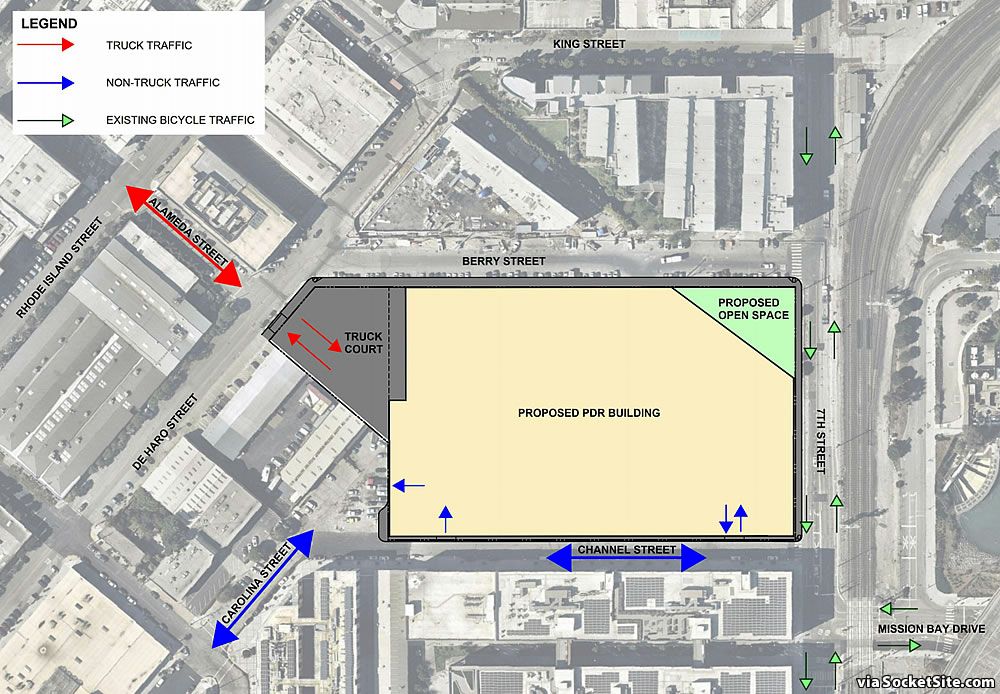Recology wanted to build housing on a site that was formerly home to 300 garbage trucks, but neighbors pushed back and said the city can't lose its land zoned for PDR (production, distribution, and repair). Now some of those same neighbors, faced with a PDR use that happens to be delivery behemoth Amazon, are again pushing back.
It's a truth universally acknowledged that in almost any instance in which someone wants to build or change something in San Francisco, there will be a chorus of San Franciscans who will not like it and will make sure their voices are heard. In some cases, these objections reflect a deep love of the place and a desire to preserve the character of neighborhoods. In other cases, they are knee-jerk reactions to any type of change or development.
Some SF denizens would argue that without this motivated populace and the sympathies of its politicians, the city would have long ago lost its charming streetscapes and picturesque character. Others would contend that it's just this sort of NIMBYism and resistance to change that has stifled much-needed housing development over several decades and created the affordability crisis we now face. And while liberals now tout the need for affordable housing, it was liberals of an earlier generation who fought against the forces of capitalism that might have gotten more housing built, and thereby kept prices in check. (But there is good reason to doubt whether that latter argument would hold up in the case of "special" cities with robust job markets and enormous and perennial demand for housing at all levels.)
Then you have counter-arguments about industrial uses and the city's need for blue-collar jobs, and how we mustn't let the need for housing and the lucrative appeal of transforming industrial-zoned land into residential deter the city from maintaining its industrial corners.
That argument led to the current squabble over Amazon's plans to open a new distribution center at the edge of the Design District, at 7th and Berry streets. Amazon unveiled its plans a year ago for a six-acre warehouse and delivery-truck hub at 900 7th Street, and even though the site is zoned for just this type of use — and it was previously home to a loud brigade of hundreds of Recology trucks — some neighbors are not happy that it's Amazon moving in.
When SFist reported on the sale of the property back in December 2020, we noted that it meant Recology was scuttling its housing-development plans — the plan was for more than 1,000 units over offices and warehouse space. And while the loss of 1,000 units from the housing pipeline isn't great, we noted it may not be a bad thing given the dismal job market of the pandemic, and the long-term need for the kinds of jobs that Amazon provides.
We also noted that Amazon's footprint in the city was growing overall, with a couple of warehouse sites in the southeastern quadrant around Potrero and Dogpatch. Now, as the Chronicle reports, some residents of those neighborhoods feel "surrounded" by Amazon and its gray trucks. And the paper speaks to at least a few neighbors who are decrying the "intensity" of Amazon's proposed use of the property — which, as SFist reported in November, would include trucks arriving from larger distribution hubs between 8 p.m. and 6 a.m., and a fleet of around 200 delivery vans coming and going starting around 10 a.m. each day. The site would employ up to 500 people.
It should be noted that in objecting to Recology's previous plans for the six-acre site, at least one public commenter said "housing is not needed in the neighborhood," and another who supported keeping it industrially-zoned said the city was in a "PDR crisis."

The city has been very accommodating to Amazon and its plans so far, but as Board of Supervisors President Shamann Walton told the SF Standard last month, the nature of the back-room negotiations so far "signals that Amazon is an irresponsible neighbor."
Amazon and the city have plenty of time to take public comment on the project, with construction on the new 200,000-square-foot warehouse not set to begin for another 18 to 24 months. And the company still doesn't have all its approvals lined up.
But in a dense city, where housing is sometimes going to butt up against PDR-zoned areas like this, conflicts are inevitable. Shouldn't everyone be glad that it's a fleet of 200 lightweight vans (and some overnight trucks) going in and out instead of 300 garbage trucks, though?
Previously: Amazon Reveals More About Its Planned Potrero Warehouse on Former Recology Site

